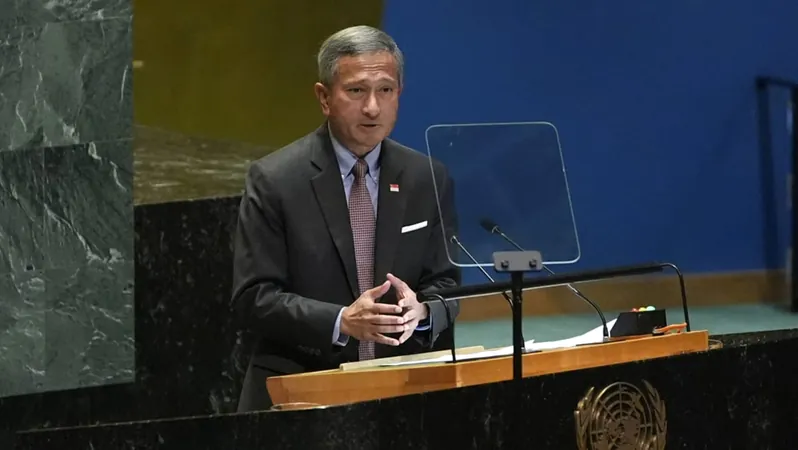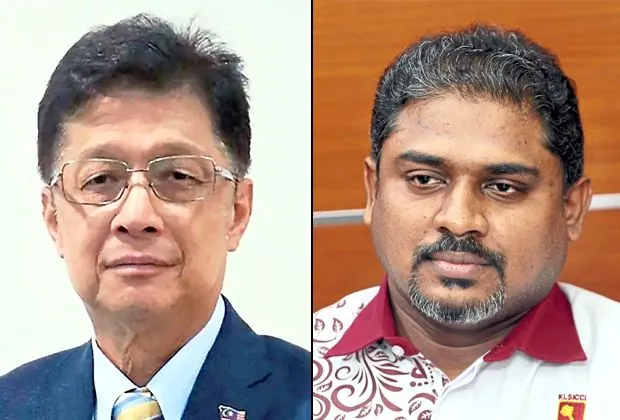
Singapore Calls for a Bold Transformation of the United Nations to Tackle Future Challenges
2024-09-29
Introduction
In a powerful address at the United Nations General Assembly, Singapore's Minister for Foreign Affairs, Dr. Vivian Balakrishnan, articulated a compelling vision for a reformed United Nations that is “future-ready” to effectively confront the pressing global challenges ahead.
Empowering the UN and Small States
Dr. Balakrishnan underscored the urgent necessity of empowering the UN to enhance its efficiency and effectiveness, particularly stressing the importance of making global governance institutions more representative of the diverse needs of small states and developing countries. "We must transform the UN to ensure it is capable of effectively addressing contemporary realities, especially in light of the shifts in global geopolitics," he stated.
Reforming the Security Council
A key aspect of this transformation involves reforming the UN Security Council to expand both its permanent and non-permanent membership, thus enabling it to better reflect today’s global landscape. This reform is seen as vital not only for legitimacy but also for ensuring that smaller nations have a voice in critical international decisions.
Involving Younger Generations
Dr. Balakrishnan passionately advocated for the involvement of younger generations within UN initiatives, asserting that they must be empowered as “agents of change” to rejuvenate international collaboration and responses to shared global crises.
Reinforcing International Law
A critical component of this discourse was the reinforcement of the UN's foundational role in upholding international peace and security. "Returning to basics – maintaining respect for international law and the UN Charter – is essential," Dr. Balakrishnan emphasized. He condemned recent violations of these principles, specifically highlighting the war in Ukraine as a "flagrant violation" that cannot be normalized under any circumstances.
Sovereignty of Small States
He articulated the existential threat faced by smaller nations if the principle of “might is right” gains traction globally. “We, as a small state, prioritize our sovereignty and autonomy, insisting that multilateralism and adherence to international law are not just preferences, but necessities for our survival,” he added.
Veto Powers and Security Council Dynamics
Dr. Balakrishnan, speaking during the ongoing 79th session of the United Nations General Assembly, has also emphasized the need for countries to redress the use of veto powers by the five permanent members of the Security Council—China, France, Russia, the United Kingdom, and the United States. He pointed out the impact of such vetoes on international peace efforts, citing recent instances where the US and other powers used their vetoes to deny humanitarian assistance in conflict zones.
Evolving with Global Changes
In his conversations with media representatives, Dr. Balakrishnan reiterated that the dynamics of the Security Council must evolve to remain relevant. "Our world has dramatically changed since 1945; thus, the Security Council must evolve in parallel to these transformations to remain functional and effective," he stated.
Importance of International Law
Moreover, he emphasized the paramount importance of international law in today's fragmented world, asserting that the UN remains the only universally recognized authority capable of setting global norms and expectations. "When consensus is achieved at the UN, it holds weight. Therefore, instead of deeming the UN irrelevant, we should strive to refine and enhance its processes," he proposed.
Recent Agreements and the Pact for the Future
At the recent Summit of the Future, Dr. Balakrishnan celebrated the adoption of critical agreements aimed at addressing global conflicts, environmental challenges, and technological disruptions. He applauded UN Secretary-General Antonio Guterres for his efforts in promoting a "Pact for the Future" that seeks to foster effective, inclusive, and networked multilateralism.
Sustainable Development Goals and Climate Action
In addition to institutional reforms, Dr. Balakrishnan stressed the urgency of pursuing the UN's Sustainable Development Goals (SDGs). With less than six years to achieve the ambitious 2030 Agenda, Singapore highlighted the need to focus efforts on supporting vulnerable nations. "Sustainable development is the cornerstone for lasting peace and security,” he said, emphasizing climate change as an area needing immediate collective action, particularly for island nations like Singapore that face acute risks from rising sea levels.
Singapore's Climate Commitments
Despite its modest global emissions, Singapore is committed to ambitious climate targets, vowing to peak emissions before 2030 and achieve net-zero by 2050, demonstrating its leadership in the global climate dialogue.
Conclusion
As the world grapples with multifaceted challenges, Dr. Balakrishnan’s calls for reforming the UN resonate crisply as he urges a collective commitment to rebuild and modernize its mechanisms to build a safer, more equitable world for future generations.




 Brasil (PT)
Brasil (PT)
 Canada (EN)
Canada (EN)
 Chile (ES)
Chile (ES)
 España (ES)
España (ES)
 France (FR)
France (FR)
 Hong Kong (EN)
Hong Kong (EN)
 Italia (IT)
Italia (IT)
 日本 (JA)
日本 (JA)
 Magyarország (HU)
Magyarország (HU)
 Norge (NO)
Norge (NO)
 Polska (PL)
Polska (PL)
 Schweiz (DE)
Schweiz (DE)
 Singapore (EN)
Singapore (EN)
 Sverige (SV)
Sverige (SV)
 Suomi (FI)
Suomi (FI)
 Türkiye (TR)
Türkiye (TR)